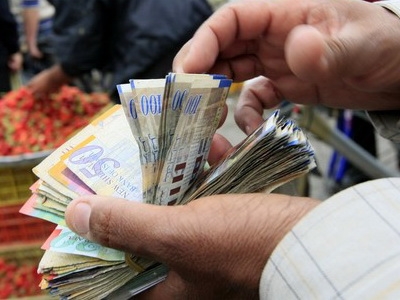Palestinians line up for dwindling cash in Gaza

Local banks in Gaza, under pressure from Israeli sanctions, are running out of cash and desperate Palestinians lined up at branches Monday hoping to pull money out of frozen accounts. But most banks have sharply curtailed withdrawals over the past two weeks and some have posted signs telling customers they cannot take out any more money. The U.N. stopped distributing cash handouts to Gaza’s poorest last week. Economists and bank officials are warning that tens of thousands of civil servants will not be able to cash paychecks next month. “No society can operate without money, but that’s the situation we are reaching in Gaza,” said economist Omar Shaban. The Israeli shekel is a widely used currency in the Gaza Strip, and the territory needs at least 400 million shekels, or about $100 million, each month in new currency to replace aging notes and to pay salaries. The main source of currency is the moderate Palestinian President Mahmoud Abbas’ government in the West Bank, which sends in currency shipments each month to pay its civil servants. The government dominated by the Fatah faction still claims authority over Gaza, despite losing control of the territory last year to the rival Hamas militant group. Israel has not allowed cash shipments since October, part of a series of sanctions against Hamas since the group seized power from Fatah in June 2007. Israel tightened the blockade earlier this month in response to renewed rocket attacks out of Gaza, virtually sealing the crossings since the latest outbreak of violence. But it opened the crossings Monday for the first time in weeks, allowing fuel and humanitarian supplies into Gaza. Mahmoud Khazandar, head of the gas station owners’ association, said Israel resumed pumping some diesel fuel to Gaza’s only power plant. He said he did not know how much EU-funded fuel was being shipped. Fuel had last been shipped to the power plant Nov. 11, but the supply only kept it running for two days. Israeli Defense Minister Ehud Barak also ordered the crossings to open to allow food and medicine in, his office said. It was unclear how much aid was going into Gaza or when the deliveries would actually be made. Israel stopped cash shipments, fearing Hamas would use money to fund attacks. But the cash shortage has little effect on Hamas, which smuggles money into Gaza through tunnels from Egypt and does not deal with the formal banking system. The militant group distributes cash to its own loyalists and the thousands of people it employs. Shaban said the money shortage has worsened because residents tend to keep savings stashed at home, rather than in banks. Gaza businessmen pay in cash for goods imported from Israel, another drain on currency. Gaza’s tunnel smugglers, who bring fuel and other goods into Gaza from Egypt, also pay for purchases in shekels. Little money comes into the territory, meanwhile, because Israel has banned exports. Jihad al-Wazir, of the Palestinian Monetary Authority in the West Bank, said his agency has asked Western officials to pressure Israel to allow the money in time to pay December salaries. Mideast envoy Tony Blair and the World Bank have also contacted Israel about the issue. The cash crunch is the latest shortage of essential supplies in Gaza. Israel and Egypt’s tightened blockade have caused widespread power blackouts and severe shortfalls of cooking gas and flour. Israeli defense officials did not rule out further cash transfers, but said nothing could be delivered while fighting persists. Shlomo Dror, an Israel Defense Ministry spokesman, questioned the seriousness of the shortage. “We are used to the Palestinians inventing things and we are looking into their claim,” Dror said. The crunch has made life a misery for some 40,000 of the territory’s public servants, whose salaries are deposited into bank accounts by the West Bank government. Some residents head to the banks almost daily to withdraw their salaries in drips. “I’m begging the bank to give me shekels,” said public servant Shawkat Othman, who lined up at a bank for four hours this week, waiting to withdraw 700 shekels — about $175. Chris Gunness, spokesman for the U.N.’s Relief and Works Agency, said the agency halted cash handouts to 98,000 of Gaza’s poorest residents last week. Gunness said they could not obtain a daily sum of 270,000 shekels ($67,000) to make the distributions. ATMs throughout Gaza City still dispense U.S. dollars. But most Gaza residents try avoid withdrawing dollars because money changers are expensive. Instead, Gazans deal in tattered, greasy Israeli notes. Residents mostly use cash — few stores accept credit cards. Instead of harming Hamas, the cash shortage seems to be hurting Abbas’ West Bank government, which needs to pay salaries to shore up support for his rule. “The absence of shekels in Gaza is weakening one of the few tools left to (the Abbas government) that it could use to have influence in Gaza,” said Shaban, the economist. “And that is salaries to thousands of public servants.”
